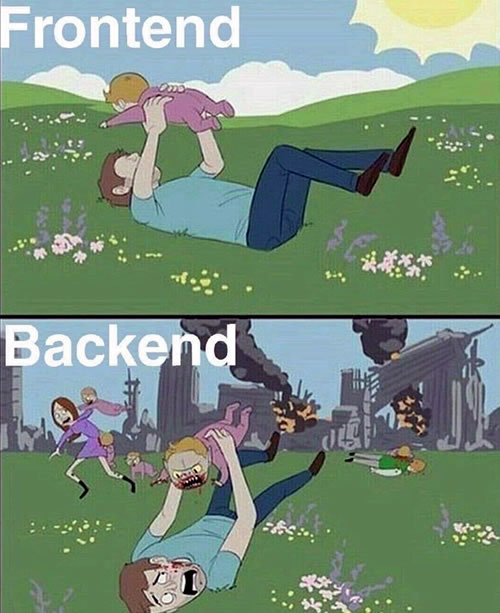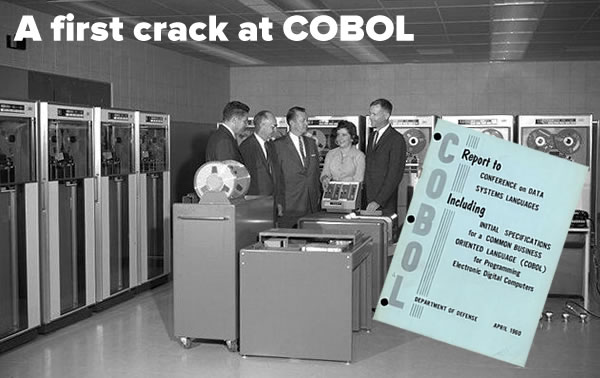
Funny because it’s (often) true.
(You might also want to check out this post of mine from 2018.)

Thanks to Renoir Boulanger for the find!

Hey, all you cool cats and — er, Tampa Bay techies, entrepreneurs, and nerds! Welcome to week 4 of the Florida general stay-at-home order! I hope you’re managing and even thriving. It appears that event organizers are adjusting to our new, temporary version of “normal” — there are online events aplenty this week, including one on Sunday. Stay safe, stay connected, and #MakeItTampaBay!
To stay on top of the latest Tampa Bay events as well as all sorts of interested tech articles (you’ve got to see my current series on COBOL), be sure to check out Global Nerdy (globalnerdy.com) regularly!
Let me know at joey@joeydevilla.com!
If you’d like to get this list in your email inbox every week, enter your email address below. You’ll only be emailed once a week, and the email will contain this list, plus links to any interesting news, upcoming events, and tech articles.
Join the Tampa Bay Tech Events list and always be informed of what’s coming up in Tampa Bay!

It’s been an age since I last played with COBOL. The last time I got to noodle with it was on a terminal in the math building at my alma mater, Queen’s University. The terminal was hooked up to a large time-sharing system running software that couldn’t be run on my computer at the time — a 640K PC-XT made by Ogivar, which was once the top PC manufacturer in Canada — but could probably be handled by even the bottom-of-the-line laptop at Best Buy running a copy of Ubuntu Linux.
I wrote my first COBOL program in a long time today: Stupid Interest Calculator. It’s not unlike an old starter assignment from an “Intro to COBOL” course that a university in the late ’70s and early ’80s would put on the curriculum.
******************************************************************
*
* Stupid Interest Calculator
* ==========================
*
* A sample COBOL app to demonstrate the programming language
* and make me doubt that I’m living in the 21st century.
*
******************************************************************
IDENTIFICATION DIVISION.
PROGRAM-ID. STUPID-INTEREST-CALCULATOR.
DATA DIVISION.
FILE SECTION.
WORKING-STORAGE SECTION.
* In COBOL, you declare variables in the WORKING-STORAGE section.
* Let’s declare a string variable for the user’s name.
* The string will be 20 characters in size.
77 USER-NAME PIC A(20).
* Simple one-character throwaway string variable that we’ll use
* jusr to allow the user to press ENTER to end program.
77 ENTER-KEY PIC A(1).
* The standard input variables for calculating interest.
* The principal will be a 6-digit whole number, while
* the interest rate and years will be 2-digit whole numbers.
77 PRINCIPAL PIC 9(6).
77 INTEREST-RATE PIC 9(2).
77 YEARS PIC 9(2).
* And finally, variables to hold the results. Both will be
* 5-figure numbers with 2 decimal places.
77 SIMPLE-INTEREST PIC 9(5).99.
77 COMPOUND-INTEREST PIC 9(5).99.
PROCEDURE DIVISION.
* Actual code goes here!
MAIN-PROCEDURE.
PERFORM GET-NAME
PERFORM GET-LOAN-INFO
PERFORM CALCULATE-INTEREST
PERFORM SHOW-RESULTS
GOBACK.
* Get the user’s name, just to demonstrate getting a string
* value via keyboard input and storing it in a variable.
GET-NAME.
DISPLAY "Welcome to Bank of Murica!"
DISPLAY "What's your name?"
ACCEPT USER-NAME
DISPLAY "Hello, " USER-NAME "!".
* Get the necessary info to perform an interest calculation.
GET-LOAN-INFO.
DISPLAY "What is the principal of your loan?"
ACCEPT PRINCIPAL
DISPLAY "What is the interest rate (in %)"
ACCEPT INTEREST-RATE
DISPLAY "How many years will you need to pay off the loan?"
ACCEPT YEARS.
* Do what who-knows-how-many lines of COBOL have been
* doing for decades, and for about 95% of all ATM transactions.
CALCULATE-INTEREST.
COMPUTE SIMPLE-INTEREST = PRINCIPAL +
((PRINCIPAL * YEARS * INTEREST-RATE) / 100) -
PRINCIPAL
COMPUTE COMPOUND-INTEREST = PRINCIPAL *
(1 + (INTEREST-RATE / 100)) ** YEARS -
PRINCIPAL.
SHOW-RESULTS.
DISPLAY "Here’s what you'll have to pay back."
DISPLAY "With simple interest: " SIMPLE-INTEREST
DISPLAY "With compound interest: " COMPOUND-INTEREST
DISPLAY " "
DISPLAY "Press ENTER to end."
ACCEPT ENTER-KEY.
* Yes, this needs to be here, and the name of the program
* must match the name specified in the PROGRAM-ID line
* at the start of the program, or COBOL will throw a hissy fit.
END PROGRAM STUPID-INTEREST-CALCULATOR.
Just look at that beast. It’s got all the marks of a programming language that came about in the era of punch cards, teletype terminals, and all the other accoutrements of computing in the Mad Men era. Note the way variables are defined, procedures without parameters or local variables, ALL-CAPS, and clunky keywords like PERFORM to call subroutines and COMPUTE to assign the result of a calculation to a variable.
Here’s the output from a sample run:
Welcome to Bank of Murica! What's your name? Joey Hello, Joey ! What is the principal of your loan? 10000 What is the interest rate (in %) 18 How many years will you need to pay off the loan? 5 Here’s what you'll have to pay back. With simple interest: 09000.00 With compound interest: 12877.57 Press ENTER to end.
I’ll go over this app in more detail in an upcoming post. In the meantime, if curiosity or boredom got the better of you and you followed the instructions in an earlier post of mine and downloaded GnuCobol and OpenCobolIDE for macOS, you can either enter the code above or download the file and take it for a spin (1KB source code file, zipped).

Are you looking for someone with both strong development and “soft” skills? Someone who’s comfortable either being in a team of developers or leading one? Someone who can handle code, coders, and customers? Someone who can clearly communicate with both humans and technology? Someone who can pick up COBOL well enough to write useful articles about it on short notice? The first step in finding this person is to check out my LinkedIn profile.
This afternoon (Friday, April 17, 2020) from 2:00 – 3:00 p.m. EDT, Established — an organization focused on helping organizations with their innovation, startup, and communication strategies — will showcase the following startups working on COVID-19 solutions in an online presentation:
You can find out more about these startups on Established’s “Startup of the Year” COVID-19 resources page.
Registration for the event is free; just register on their Eventbrite page.
Don’t forget that today, Thursday, April 16, 2020, is the last day that you can get Apress’ Beginning COBOL for Programmers at a discount! Use the coupon code SPRING20A when checking out to get $20 off orders $40 and above. That knocks down the price to $29.99 — but only for today.
Every time ancient banking and government software that’s still in use on “big iron” runs headlong into a problem it was never meant to handle, from Y2K to the COVID-19 stimulus check program, COBOL returns to the spotlight. Here are some recent news articles featuring the language. Most of these have been published in the last seven days:
There’s a fine line between genius and madness, and Cloudflare are riding that line by making it so that you can code Cloudflare workers in COBOL! They have a number of simple examples posted, including a Rock, Paper, Scissors web applet written in COBOL (pictured in the screenshot above).
It looks as though they’re using GnuCobol to compile COBOL code into C, and then compiling that C into WebAssembly. I like to refer to this sort of cobbling as “the Flintstones-Jetsons approach”.
If you’re on a Mac and want to dive into COBOL coding, don’t forget that I have a quick and dirty to installing a COBOL compiler and IDE on macOS. If you’ve already got Homebrew and Python 3 installed, you can probably go through the process in about a minute.

Are you looking for someone with both strong development and “soft” skills? Someone who’s comfortable either being in a team of developers or leading one? Someone who can handle code, coders, and customers? Someone who can clearly communicate with both humans and technology? Someone who can pick up COBOL well enough to write useful articles about it on short notice? The first step in finding this person is to check out my LinkedIn profile.